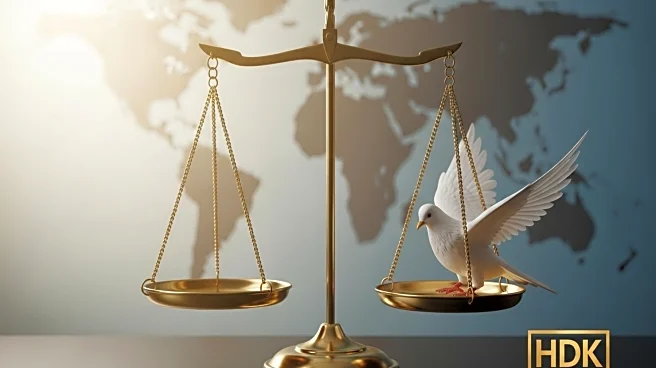What's Happening?
Filippo Grandi, the U.N. High Commissioner for Refugees, has criticized the United States under President Trump for deportation practices that allegedly violate international law. In a speech, Grandi expressed concern over a global backlash against migrants and refugees, highlighting drastic funding cuts that have forced the UNHCR to reduce its workforce by nearly 5,000 jobs this year. Despite these challenges, Grandi acknowledged positive developments, such as peace efforts in Congo led by the Trump administration, which have contributed to stability in the region. The Trump administration has advocated for a revamp of the global asylum system, arguing that it has been abused, and has pushed for stricter migration controls.
Why It's Important?
The criticism from the UN refugee agency underscores tensions between international humanitarian standards and national immigration policies. The U.S. approach to migration, as defended by the State Department, emphasizes secure borders and lawful immigration, reflecting domestic political priorities. However, Grandi's remarks highlight concerns about the erosion of international law and the impact on global refugee support systems. The funding cuts and policy shifts could affect millions of displaced individuals worldwide, particularly as traditional donor countries reduce their aid contributions. This situation poses challenges for international cooperation on refugee and migration issues.
What's Next?
The ongoing debate over migration policies is likely to continue, with potential implications for international relations and humanitarian efforts. The UNHCR may seek to engage with the U.S. and other countries to address concerns about deportation practices and funding shortages. As Grandi's term ends, his successor will face the challenge of navigating these complex issues while advocating for refugee rights. The U.S. may continue to push for reforms in the global asylum system, potentially influencing other countries' policies and practices.
Beyond the Headlines
The broader implications of this situation include ethical considerations regarding the treatment of refugees and migrants. The tension between national sovereignty and international humanitarian obligations raises questions about the balance between security and compassion. Long-term shifts in migration policies could affect global stability and the ability of countries to respond to humanitarian crises. The discourse around migration and asylum may also influence public perceptions and political dynamics in various regions.










